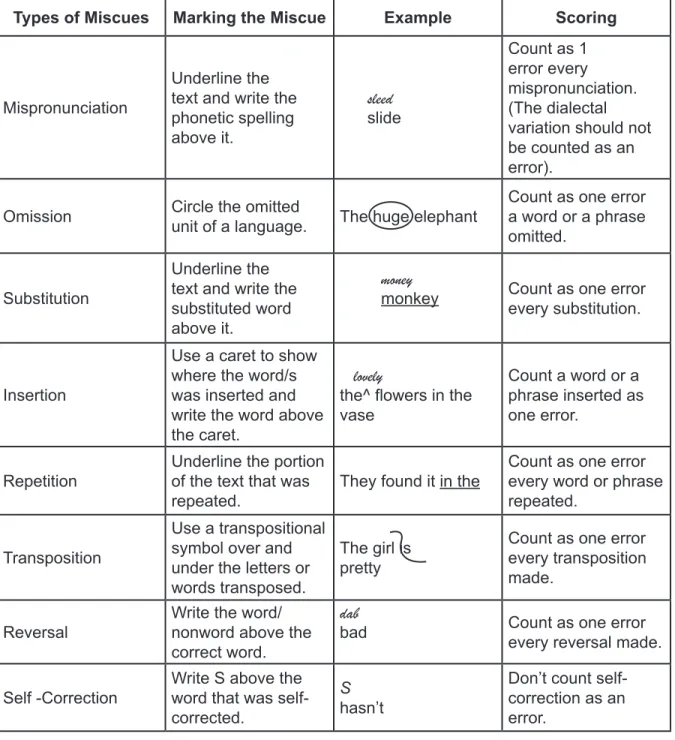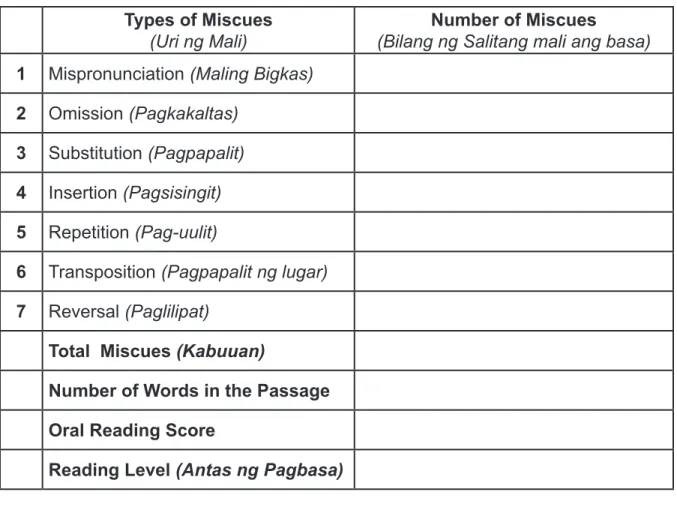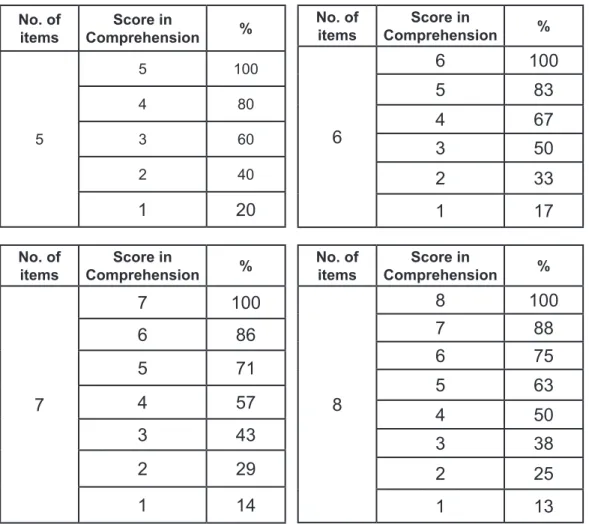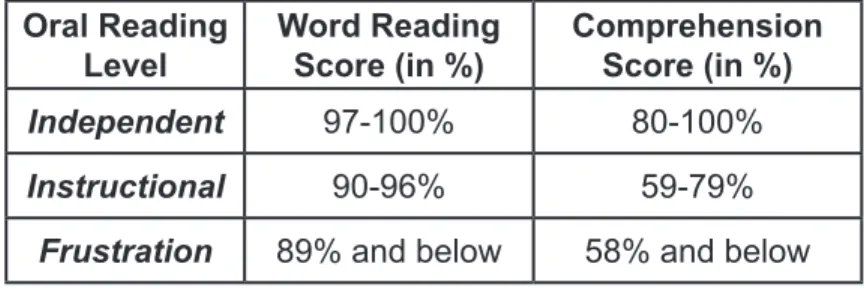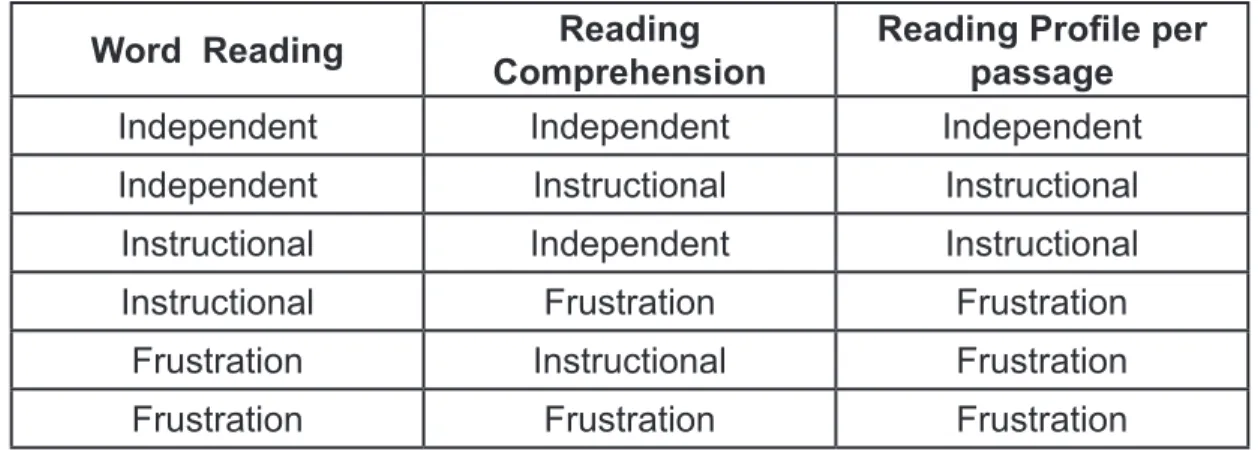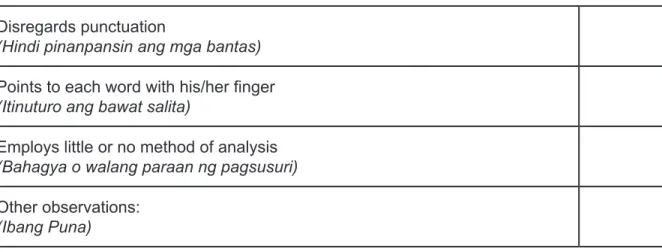Republic Act 8293, Section 176 states that, “No copyright shall subsist in any work of the Government of the Philippines. However, prior approval of the government agency or office where the work was created must be necessary for the use of this work for profit. The Department of Education through the Bureau of Instructional Delivery expresses its gratitude to the various individuals, writers and consultants who contributed to the development of the Philippine Informal Reading Inventory Manual (Phil-IRI).
Special recognition is given to the original team of authors (English and Filipino groups) from DepEd regions and divisions - selected Education Program Supervisors, Master Teachers, Principals, Assistant School Division Superintendents, Head/Assistant Head of Education Divisions (2009) and private individuals who contributed their expertise in the development of shared the tools. The Philippine Informal Reading Inventory (Phil-IRI) is an initiative of the Bureau of Learning Delivery, Department of Education, which directly addresses its quest to make every Filipino child a reader. It is anchored on the flagship program of the Department: "Every Child a Reader Program," which aims to make every Filipino child a reader and a writer at his/her grade level.
The data must also serve as one of the bases in planning, designing/redesigning reading programs or activities in the school to improve the school's overall reading performance. It is important for teachers to study the manual and be informed about the proper administration of the 2018 Phil-IRI.
Essential Information about the Phil-IRI
- What is the Phil-IRI?
- Why was the Phil-IRI developed?
- What adjustments were made in the Phil-IRI selections?
- What can Phil-IRI tell the teachers?
- What are flexible ways to use Phil-IRI?
- Who needs to take the Phil-IRI?
- When should Phil-IRI be administered?
- How long does it take to administer the Phil-IRI
- Who can administer the Phil-IRI?
- How do we get a copy of the Phil-IRI materials?
The Phil-IRI Group Screening Test (GST) can tell teachers if students are reading at, above, or below their grade level. Individually administered Phil-IRI graded passages can be used to assess students' levels of oral reading, silent reading comprehension, and/or listening comprehension. When used to assess oral reading, the Phil-IRI can be used to describe decoding and word recognition, fluency, and comprehension.
When used to assess Silent Reading Comprehension, Phil-IRI can be used to describe reading speed and comprehension. The Phil-IRI GST can be used to determine the reading level of an entire class, and identify specific students who may need more help completing reading tasks. The individually administered Phil-IRI graded passages can be used to assess a student's independent, instructional, and frustration levels for three types of literacy tasks: Oral Reading, Silent Reading, and Listening Comprehension.
The time required to manage Phil-IRI graded transitions would vary for each student. ELLN-trained teachers can administer Phil-IRI graded transitions to individual students who need further assessment. The region and/or department may also conduct training programs for teachers on Phil-IRI management.
Description of the Phil-IRI Testing Kit
- Manual of Administration
- The Phil-IRI Group Screening Test
- The Phil-IRI Graded Passages (Sets A, B, C and D)
- Phil-IRI Forms
All Philippine subject teachers for grades 3 to 6 and English subject teachers for grades 4 to 6 can administer the Phil-IRI Group Screening Tests in their respective classes. The manual also contains the correction keys for both the group screening tests and the Phil-IRI graded passages in Filipino and English. The Phil-IRI Group Screening Test (GST) is a silent test administered in both Filipino and English.
The Phil-IRI Graded Passages is an informal, individualized assessment instrument used to record student performance in oral reading, silent reading, and/or listening comprehension. The Phil-IRI silent reading test can be administered after the oral reading test has been administered to further check the student's comprehension skills. Appendix A5 to A12 presents the titles of passages used for the Phil-IRI Graded Passages (Pre-Test and Post Test) in both Filipino and English.
This form has the same content and objectives as Phil-IRI Form 1A. Form Phil-IRI 1B will be used for GST in English. This form summarizes each student's performance and level in reading and word comprehension across the administered Phil-IRI.
General Directions for Administration: The Four Stages
- Stage 1: Initial Screening Using the Phil-IRI Group Screening Test
- Stage 2: Administration of the Phil-IRI Graded Passages (Pre-Test)
- Stage 3: Provision of Specialized Instruction
- Stage 4: Administration of the Phil-IRI Graded Passages (Posttest)
An example of this form is shown in Appendix E. Administration of the Phil-IRI Listening Pretest for English/. Student continues to receive classroom instruction. All students from grades 3 to 6 undergo the Phil-IRI Filipino Group Screening Test; all students from grades 4 to 6 undergo the Phil-IRI English GST. Administration of the Phil-IRI Posttest (English/Filipino). Progress reports to be submitted to the Principal) Figure 1: Stages in the administration of Phil-IRI.
For SY, the Phil-IRI Group Screening Test (GST) in Filipino must be taken for Grades 3-6 and the GST in English must be taken for Grades 4-6 in the first month of the school year. Please note that a student may take Phil-IRI graded passes in one or both languages. After receiving specialized instructions, students will be re-evaluated using the Phil-IRI post-examination results forms.
The Phil-IRI posttests have a total of 4 parallel sets (SETS A-D) that the test administrator can choose from. Specific Instructions for Administering the Phil-IRI Group Screening Test This section details specific instructions for the Group and Individual Screening Test.
Specific Directions for the Administration of the Phil-IRI Group Screening Test
Conducting the Phil-IRI Graded Passages Pretest
The Phil-IRI Listening Comprehension and Silent Reading Test
Conducting the Reading Intervention
Based on the reading difficulty of the student, a reading intervention program is designed for him/her. It discusses some cases of different reading difficulties of some pupils and the recommended intervention. It also looks at the behavior of some readers, as recorded in Table 9 (word-for-word reading, reading in a monotonous tone, disregarding punctuation...) and tries to correct it during the reading intervention.
Conducting the Phil-IRI Graded Passages Posttest
-na hindi pinansin ni Nelia habang kausap ang matanda. kanyang mga ari-arian d. saan ang istasyon ng bus

